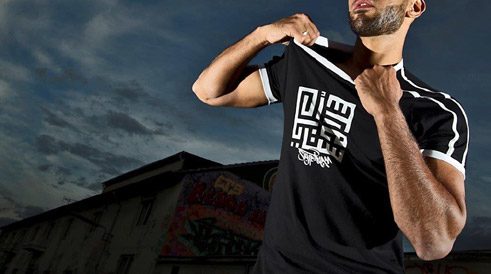In 2005, when the cartoon controversy was escalating and Islamist terrorists executed devastating attacks in London, Witten design student Melih Kesmen had the idea of giving Islam a friendly face. His T-shirt with the slogan “I Love My Prophet” was such a hit that he unexpectedly became a successful entrepreneur. A conversation about Islamophobia, fashion and life in Germany.
Herr Kesmen, as a matter of fact you hadn’t planned to found the label Styleislam at all …
As a European and German Moslem, I actually did the whole thing for people like me, who are always being confronted with a distorted image of Islam that has been influenced by the tabloid press. After all, I noticed that people get nervous when I get into a bus because they think I am a potential terrorist or part of a sleeper cell. I wanted to set something positive against this feeling of powerlessness, and so the idea for the T-shirt with the slogan “I Love My Prophet” came about in 2005, because I wanted to define my relationship to the Prophet and to my faith through love.
In doing so, you reference the Quran.
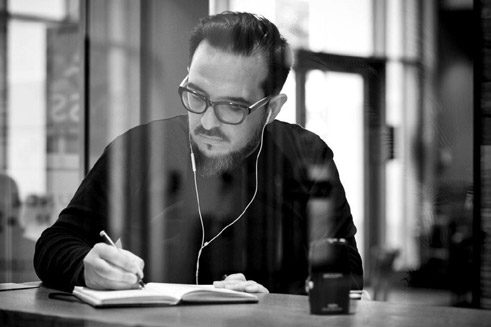 Portrait Melih Kesmen, Styleislam 2015
| Photo: Robert Hörnig
Exactly! Lots of people don’t know, for instance, that of the 114 Suras of the Quran, a total of 112 begin with the name of God and refer to him as the All-Merciful and the Compassionate. But the widespread image of Islam today has nothing whatsoever to do with compassion! Something’s not right here! I made the T-shirt to counteract this contradiction. For people like me, who are always having to justify themselves, but really don’t fancy that at all … (laughs).
Portrait Melih Kesmen, Styleislam 2015
| Photo: Robert Hörnig
Exactly! Lots of people don’t know, for instance, that of the 114 Suras of the Quran, a total of 112 begin with the name of God and refer to him as the All-Merciful and the Compassionate. But the widespread image of Islam today has nothing whatsoever to do with compassion! Something’s not right here! I made the T-shirt to counteract this contradiction. For people like me, who are always having to justify themselves, but really don’t fancy that at all … (laughs).
You then went about with your T-shirt in London, where you lived at the time.
Yes, the effect was amazing sometimes! Lots of Moslems were happy to see a positive Islamic message, many people’s eyes really lit up. They just saw that one can broadcast a positive statement as an Islamic-looking person.
Where do you sell your T-shirts and bags?
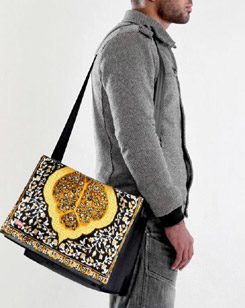 Styleislam 2015
| Photo: Robert Hörnig
We sell them not only in Germany, Great Britain and the USA, but also export to Japan, Kazakhstan, Brazil, Australia, to all sorts of exotic countries, also to South Africa where we even have a store.
Styleislam 2015
| Photo: Robert Hörnig
We sell them not only in Germany, Great Britain and the USA, but also export to Japan, Kazakhstan, Brazil, Australia, to all sorts of exotic countries, also to South Africa where we even have a store.
Who wears StyleIslam fashion?
The majority of our customers are of course Moslems, most of whom live in Europe. But there are surprisingly many non-Moslems who like our things, at least a quarter of our customers. But they wear T-shirts with the slogan “Jesus and Muhammad – Brothers in Faith.”
How do clothing, fashion and Islamic religion fit together?
That’s a question of culture. Over the centuries, a fashion has developed that is inspired by the Islamic spirit. This of course has always had its respective, specific geographic characteristics. But overall, fashion in the present as in the past must cover the “aura” – in other words whatever appears unnecessarily sexy. As long as that is met, designers can create their fashions.
What inspires the fashion label Styleislam?
For the calligraphy I really enjoy cooperating with Kufi artists. Kufic script is one of the oldest forms of Arabic script. It is very minimalistic and to me has a timeless character. I also like variations on Osmanic calligraphy. What’s really exciting is the combination of Latin letters in Osmanic calligraphy style that I often use.
After two years in London you are now once again living with your family in Germany, in Witten …
-
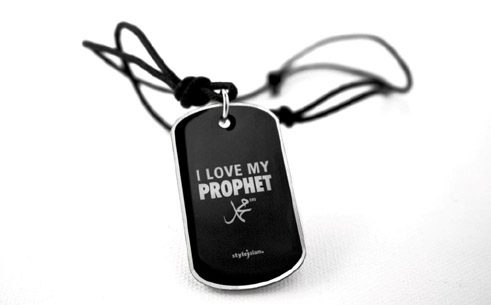 Foto: Robert Hörnig
Foto: Robert Hörnig
Styleislam
-
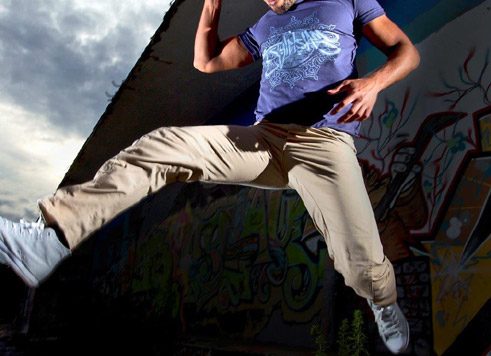 Foto: Robert Hörnig
Foto: Robert Hörnig
Styleislam
-
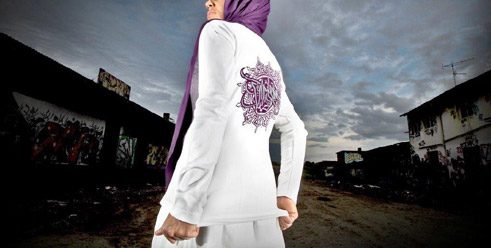 Foto: Robert Hörnig
Foto: Robert Hörnig
Styleislam
-
 Foto: Robert Hörnig
Foto: Robert Hörnig
Styleislam
-
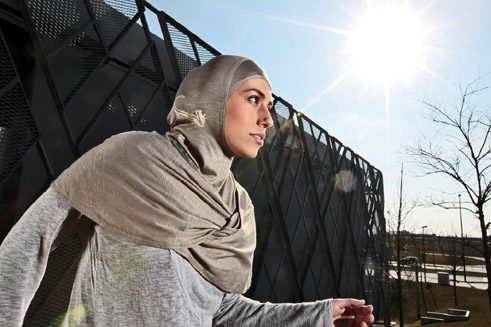 Foto: Robert Hörnig
Foto: Robert Hörnig
Styleislam
-
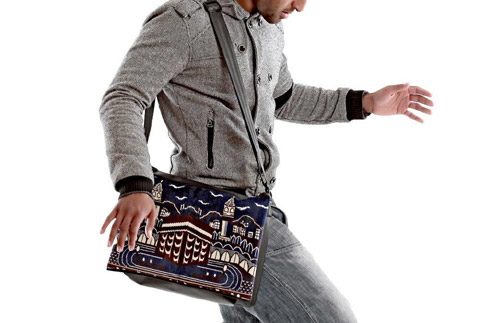 Foto: Robert Hörnig
Foto: Robert Hörnig
Styleislam
-
 Foto: Robert Hörnig
Foto: Robert Hörnig
Styleislam
-
 Foto: Robert Hörnig
Foto: Robert Hörnig
Styleislam
- 1
- 2
- 3
- 4
- 5
- 6
We wanted to raise our children in a place where we have a sheltered environment, our friends and family. In fast-paced London we would have needed at least ten years to build up a deeply-rooted circle. Our decision also had to do with the need to build up and cultivate close friendships. The Ruhr region has been an immigration area for over 150 years, and we feel comfortable and at home here. This really is our homeland here.
Do you feel comfortable as a Moslem here as well?
Sometimes it does get a bit on one’s nerves when people are always instructing one that Islam is “violent” and “undemocratic.” But I nonetheless seize every opportunity for a discussion to convince people that their stereotypes are wrong. I try to contribute a bit to this with my fashion as well. But if I constantly saw news reports of atrocities by the Islamic State in the Near East, if I had no other news sources, I’d think the exact same way about Islam.
You have also been attacked by Islamic hardliners …
Yes, to be sure. These charlatans have an easy time of it when most people have no solid, critical foundation in theology. Then all you need to do is wear a shaggy “Robber Hotzenplotz” beard and throw around a few rhetorical catchwords and then – unfortunately – you can move and inspire people. But things are far more complex than what a bunch of Salafists want to get people to believe. That is why I always try to encourage critical thinking when I have the opportunity to speak with young people.
Do you follow a particular school of Islam?
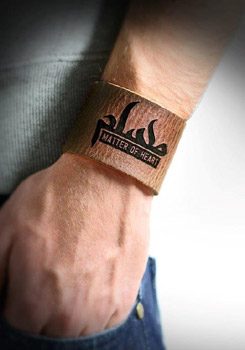 Styleislam 2015
| Photo: Robert Hörnig
Styleislam 2015
| Photo: Robert Hörnig
Have you heard of Leopold Weiß? He was an intellectual from a rabbinical Jewish family in today’s Ukraine; in 1900 his native city still belonged to Austria-Hungary. The man later converted to Islam and took the name Muhammad Assad. Through his family he had already had a really solid theological education. For instance, he is the first European Moslem to write an exegesis of the Quran. What I find so fascinating about him is that he was also able, coming from the point of view of a European, to reflect on Islam in very, very different ways from someone who grew up in an Arabic country. Critical thinking isn’t especially encouraged among young people in the Near East - this has to be said, unfortunately. This is also one of the reasons why I am proud of being a German and a European Moslem, because here I can practice my religion in a qualitatively more impartial and freer way, as I choose.
